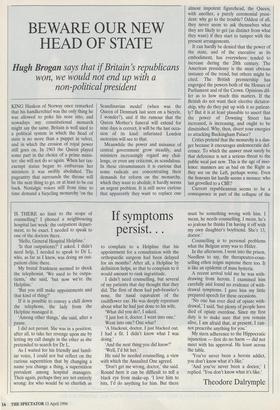If symptoms persist.. .
IS THERE no limit to the scope of counselling? I phoned a neighbouring hospital last week: the outpatient depart- ment, to be exact. I needed to speak to one of the doctors there.
`Hello, General Hospital Helpline.'
`Is that outpatients?' I asked. I didn't need help, I needed to speak to Dr L. who, as far as I knew, was doing an out- patient clinic there.
My brutal frankness seemed to shock the telephonist. 'We used to be outpa- tients,' she said, 'but now we're the Helpline.'
`But you still make appointments and that kind of thing?'
If it is possible to convey a chill down the telephone, the lady from the Helpline managed it.
`Among other things,' she said, after a pause.
I did not persist. She was in a position, after all, to take her revenge upon me by letting my call dangle in the ether as she pretended to search for Dr L.
As I waited for his friendly and famil- iar voice, I could not but reflect on the curious superstition that by changing a name you change a thing, a superstition prevalent among hospital managers. Then again, perhaps they are not entirely wrong: for who would be so churlish as to complain to a Helpline that his appointment for a consultation with the orthopaedic surgeon had been delayed for six months? After all, a Helpline by definition helps, so that to complain to it would amount to rank ingratitude.
I didn't need counselling, but several of my patients that day thought that they did. The first of them had pub-brawler's nose, the nasal equivalent of the cauliflower ear. He was deeply repentant about what he had just done to his wife.
`What did you do?, I asked.
'I just lost it, doctor. I went into one.' Went into one? One what?
`A blackout, doctor. I just blacked out. I had a fit. I didn't know what I was doing.'
`And the next thing you did know?' `Well, I'd hit her.'
He said he needed counselling, a view with which the Assaulted One agreed.
`Don't get me wrong, doctor,' she said. Round here it can be difficult to tell a black eye from make-up. 'I love him to bits, I'd do anything for him. But there must be something wrong with him. I mean, he needs counselling. I mean, he's so jealous he thinks I'm having it off with my own daughter's boyfriend. She's 13, doctor.'
Counselling is to personal problems what the Belgian army was to Hitler.
In the afternoon, I went into the prison. Needless to say, the therapeutco-coun- selling ethos reigns supreme there too. It is like an epidemic of mass hysteria.
A recent arrival told me he was with- drawing from heroin. I examined him carefully and found no evidence of with- drawal symptoms. I gave him my little prepared speech for these occasions.
`No one has ever died of opiate with- drawal,' I said, 'but plenty of people have died of opiate overdose. Since my first duty is to make sure that you remain alive, I am afraid that, at present, I can- not prescribe anything for you.'
My stern adherence to the Hippocratic injunction — first do no harm — did not meet with his approval. He leant across the table.
`You've never been a heroin addict, you don't know what it's like.'
`And you've never been a doctor,' I replied. 'You don't know what it's like.'
Theodore Dalrymple


































































 Previous page
Previous page